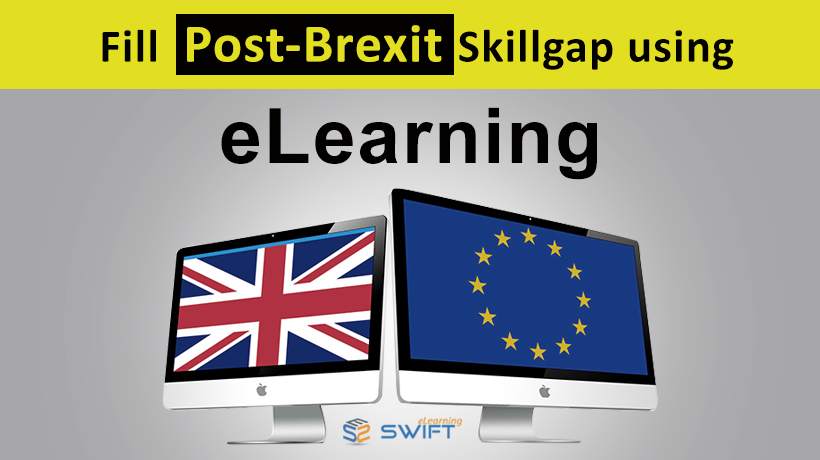Post Brexit Skill Gap and eLearning Solutions

Surely, this will have significant impact on Economics, Politics and Social aspects of both UK and EU countries.
One of the most discussed impacts is of ‘Skill Gap’ that Brexit will create in UK as well as in EU; but more significantly in UK.
One of the very reasons of Brexit to happen is ‘free movement of EU people into UK’ – it was a serious concern for larger portion of people and politicians in UK. To contain this freedom, in the new UK, there will be an immigration policy which will restrict people from EU countries (including the skilled workers) to work in UK. This will create a ‘Skill Gap’ in UK; and as a direct repercussion, we may witness the similar effect in EU countries when they put bar on UK citizens to enter their countries.
In this blog, we will not discuss whether the Brexit is good or bad for either side of the people. We will see how we can solve the ‘Skill Gap’ issue if it occurs as per the majority predictions.
eLearning Could Be One of the Most Effective Solutions for Post Brexit ‘Skill Gap’ Problem
“From every crisis we have to find an opportunity”
– Anonymous
“If you are standing still, you are also going backwards”
– Reed Markham
Post Brexit will create a state of uncertainty; no one can exactly predict how it will impact on functions of an organization. A resilient L&D can be a support for organizations to come out from difficult situations.
No doubt, eLearning is one of the most effective and efficient training model for modern frequently changing business conditions. Serous businesses make proactive measures and prepare to face future challenges.
Following are the few areas an organization may need easy and cost-effective eLearning solution:
Compliance Training:
Compliance training is undoubtedly the bigger slice of the eLearning industry. Post Brexit, its share will increase – specifically in UK to help new workforce develop professional mind-set. It is acceptable that the compliance regulations will not change in UK for short-term; but the new fresh workforce of UK will need a quick and immediate training on compliances to ensure peaceful and legal functioning of organizations.
Skill or Productivity Training:
The 2 years of time is an asset; this is enough to train new workforce on required skills. This will help organizations to maintain productivity unhampered even after EU citizens leave UK in result of draconian immigration policy.
Leadership Training:
Post Brexit, leaders need to assume important responsibility to anticipate, plan and execute to ensure smooth functioning of work process and business results. A well trained or prepared leader for the expected challenge will help organization stand unaffected.
Post Brexit Challenges for L&D or eLearning Industry
The biggest challenge to L&D is of ‘recession’. The 2008 financial crisis has witnessed huge budget cutting on training – but, Brexit is a different case, it is not global. Even if a financial crunch is observed, then this will be limited to UK or at large to EU – it will not be a global phenomenon. To remain competent with global business competitions, the UK and EU companies have to invest in training and enhance their chances of doing international trade effectively.
Our Services: Powerpoint to eLearning, Flash to HTML5 Migration, eLearning Service Provider

Leave a Reply
Want to join the discussion?Feel free to contribute!